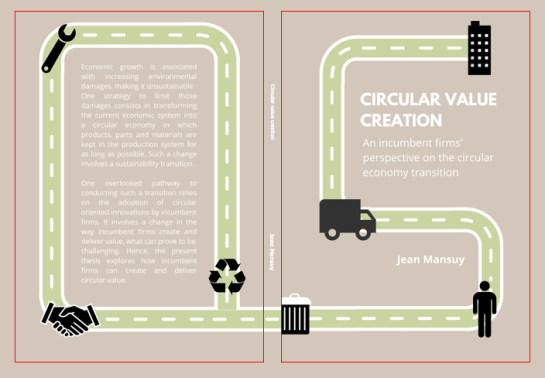
Economic growth is a major policy objective in most countries. Yet, it is associated with increasing environmental damages, related to an increase in resource use and waste production, making it unsustainable. One strategy to limit those damages consists in transforming the current economic system, where products are thrown away at the end of their useful life, into a circular economy in which products, parts and materials are kept in the production system by closing (recycling), slowing (reusing) and narrowing (reducing) resource loops. Such a replacement of the current "linear" economy with a circular one involves the transition of many socio-technical systems. One overlooked pathway to conducting such a transition relies on the adoption of circular oriented innovations by incumbent firms. It involves a change in the way incumbent firms create and deliver value, what can prove to be challenging. Hence, the objective of the present thesis is to explore how incumbent firms can create and deliver circular value.
To this end, this thesis first investigates factors impacting the development or adoption of circular oriented innovations by incumbent firms using a literature review and interviews. This leads to the development of a novel classification framework, based on the motivation, opportunity, and ability concepts. This investigation particularly highlights the importance of (1) stakeholders' behaviours at the network level and (2) resources and capabilities at the organisational level. Therefore, this thesis then focuses on ways to temper the impact of both aspects on the creation and delivery of circular value. At the network level, the impact of stakeholders on circular supply chains is analysed using a case study. The findings of this case study suggest decreasing the firm's dependence on specific partners and support further stakeholder engagement in supply chain (re)design. At the organisational level, methodological frameworks supporting incumbent firms in developing and adopting circular business models are identified and compared using a systematic review approach. While this analysis supports the utility of methodological frameworks in compensating for a lack of dynamic capabilities, it also underlines the lack of consistency among them and the lack of validation among suggested tools. It calls for further specifying the business model innovation strategy considered by a methodological framework and for more integration of existing processes and tools.
Overall, the present thesis supports the importance of jointly considering business models and supply chains in organizational transition processes towards circularity. It underlines the strong dependence of circular business models on the development of robust circular supply chains. This calls for further integration of both concepts, for example through the use of a broader ecosystemic perspective.
